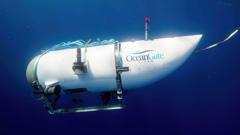In a dramatic revelation, the BBC has aired footage recorded on the support ship of Oceangate’s Titan submersible, capturing the moment the vessel imploded during what was meant to be an exploratory dive to the Titanic wreck in June 2023. The sub, which had descended deep into the Atlantic, tragically took the lives of its five passengers, including Oceangate's CEO Stockton Rush and notable figures like British explorer Hamish Harding and renowned French diver Paul Henri Nargeolet.
The recent BBC documentary titled *Implosion: The Titanic Sub Disaster* gained exclusive access to the U.S. Coast Guard’s investigation. In a particularly haunting clip, Wendy Rush, Stockton Rush's wife, could be seen questioning the sound of an ominous “bang” just before the sub's fatal descent. Recorded just as Titan was near a depth of 3,300 meters, the sound was later confirmed by investigators to be the implosion of the vessel itself.
Misinformation perhaps contributed to the tragedy, as Mrs. Rush, amidst the panic, received a text stating that Titan had dropped two weights, providing a false sense of continuity. Tragically, the signal from Titan took longer to reach the ship than the sound of the catastrophic implosion itself.
Though all five passengers were lost instantly, questions about Titan's safety and structural integrity have arisen for years leading up to this incident. Critics, including former employees and deep-sea experts, had raised flags about the sub's carbon fiber hull design, warning it was vulnerable to catastrophic failure. The U.S. Coast Guard's probe has pinpointed the initial failure of the material during a dive a year prior, with seismic sensors indicating delamination – a degradation process affecting the hull’s structural integrity.
In the documentary, businessman Oisin Fanning, who was aboard Titan for its final dives, expressed regret over trusting the submersible’s safety, reflecting the deep-rooted unease among those who had experienced its operations firsthand.
Echoing the sentiments of unease, deep-sea explorer Victor Vescovo warned others against using Titan, comparing the experience to “playing Russian roulette.” Following the implosion, recovery efforts unveiled debris scattered along the ocean floor, revealing personal items belonging to the passengers alongside fragments of the sub itself.
As the investigation progresses, the U.S. Coast Guard plans to release a comprehensive report, aiming to delineate the contributing factors leading to this disaster in hopes of enforcing stricter regulations in future deep-sea operations. In the aftermath, OceanGate has ceased operations while cooperating with ongoing investigations. Family members, including Christine Dawood, voiced their trauma and loss, emphasizing the long-lasting impacts of this tragedy.
As various lawsuits emerge and the specter of possible criminal prosecutions looms, the exploration of our oceans must be approached with the utmost diligence and respect for life. The memory of those lost on the Titan shall serve as a somber reminder of the risks inherent in deep-sea exploration. The BBC’s documentary *Implosion: The Titanic Sub Disaster*, which releases on May 27th, offers an in-depth examination of these events, highlighting both the enormity of the tragedy and the human lives intertwined with it.




















